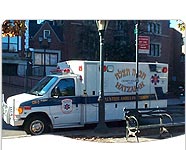 
For Obese Children And Adolescents, Small Steps Help
Summary and Comment
Obese children and teenagers often display insulin resistance and other markers of the
metabolic syndrome. To evaluate how much weight loss is needed to reverse insulin resistance
in obese children (BMI 97th percentile), investigators studied changes in insulin sensitivity and
fat metabolism in 57 children (age range, 6-14 years) participating in a weight loss program
over a 1-year period. The authors obtained insulin levels and free-fatty-acid and blood-glucose
concentrations at baseline and 1 year; they then calculated an insulin sensitivity index (ISI) for
each child. They also studied ISI values in 10 normal-weight children during a 3-month period.
All values were significantly higher in the obese children than in the controls. Because BMI
scores are not normally distributed, the investigators calculated BMI-standard deviation scores
(BMI-SDS). They classified the children by degree of reduction in BMI-SDS at 1 year (0.5; 0.25-0.5;
<0.25; or increase in BMI-SDS). Only children and adolescents whose BMI-SDS decreased by 0.5 or
more had significant decreases in insulin and free-fatty-acid levels and improvement in ISI.
Comment
According to the author (personal communication), a change in BMI-SDS of 0.5 is equivalent
to a change in BMI of 1 to 2 points (e.g., from a BMI of 27 to 26 or 25). Growing children who
maintain their weight over 12 months can decrease their BMI-SDS by 0.5 or more. A menarcheal
15-year-old girl -- height 5'5", BMI 28 -- could achieve the same goal by losing 10-15 pounds (<10%
of her body weight). Pediatricians can reassure patients and families that modest loss or maintenance
of weight (depending on age and pubertal status) can enhance the health of obese children. — Alain
Joffe, MD, MD, MPH, FAAP
Published in Journal Watch Pediatrics and Adolescent Medicine February 1, 2005
Source
Reinehr T et al. Insulin sensitivity among obese children and adolescents, according to degree of
weight loss. Pediatrics 2004 Dec; 114:1569-73.
The above message comes from "Journal Watch Pediatrics", who is solely responsible for
its content.
The above is for general informational purposes only. Always consult your
physician regarding specific medical issues and call Hatzalah or your local
ambulance service in the event of an emergency.
Back to Digest Index
|









